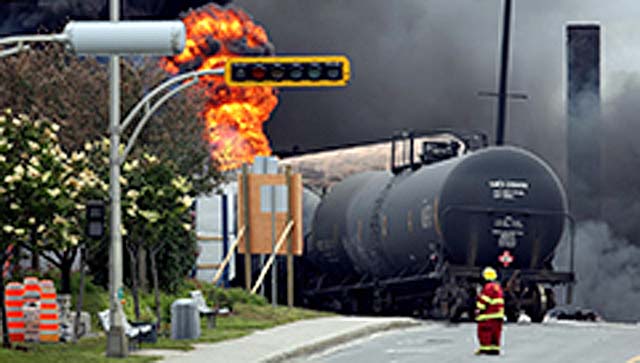
for Tragic Accident
Lake Megantic Quebec - Biography
Fritz Edler is a veteran locomotive engineer and wreck investigator, with 40 years of railroad experience.
He became chair of the Harding and Labrie Defense Committee after hearing Harding's attorney speak at a Community Rail safety conference in Chicago.
I've made 8 investigative trips to Canada in conjunction with the defense as well as supporting the rail safety efforts of the Lake Megantic citizens.
Transcript
DIMITRI LASCARIS: This is Dimitri Lascaris for The Real News reporting from Montreal, Quebec. The small town of Lake Megantic in Quebec's historic Eastern Townships will forever be associated with one of the deadliest accidents in Canadian history. On the morning of 6 Jul 2013 a crude oil train explosion killed 47 people. The train was carrying volatile crude oil from the Bakken Shale oilfields of North Dakota. It derailed and exploded, killing residents and destroying the town's downtown area. The mass funeral in the town of just over 5,000 persons was broadcast live across Canada. It became a national day of mourning. Over four years later, on Friday of last week, a Canadian jury found three former rail workers not guilty of criminal negligence causing the deaths of Lake Megantic residents. The question must now be asked, why were the workers charged for this tragedy? Moreover, why was no executive of the Montreal Maine & Atlantic Railway (MMA) Company prosecuted? With us to discuss this, I am pleased to be joined by veteran train engineer and wreck investigator Fritz Edler, chairperson of the defense committee for Tom Harding and Richard Labrie, two of the workers who were charged and found not guilty. Fritz joins us today from Washington, D.C. Fritz, thank you very much for joining us on The Real News.
OKthePK Joint Bar Editor: Author's puffery, there was and is no "national day of mourning".
FRITZ EDLER: Pleasure. Glad to be with you.
DIMITRI LASCARIS: Fritz, let's start by talking about the basic allegations against the acquitted railway workers. What was the essential basis of the Crown's allegations of criminal negligence and in your view, why did the prosecution fail?
FRITZ EDLER: Well, it seemed plain to us from the beginning that this was putting the things in the wrong order. In other words, for the people in the town, and for people in Canada and across North America, who wanted to know why this wreck took place and what we could do to prevent it, it was completely wrong to start out from just moments after, days after the wreck, with an exclusive focus on Tom Harding and then later his coworker, Richard Labrie, and decide that the way to find out about this wreck would be to do a criminal prosecution instead of what the people in the community wanted, which was a commission of inquiry. That real public inquiry has never taken place. This is the absolute worst way to find out why a wreck took place and who is really responsible. Instead, what the government did was they took their lead from the industry. They took their lead from Ed Burkhardt, the chair of the MMA, who in Megantic began to accuse Tom Harding of responsibility exclusively. The government took that up and made that their focus, and never really seriously pursued the broader issues for prosecution.
DIMITRI LASCARIS: Essentially, in your view, what was it that happened at the trial? I appreciate you may not be a legal expert but as somebody who is a veteran wreck investigator, why do you think this case fell apart in the end?
FRITZ EDLER: I have been called into Lake Megantic and to Quebec eight, almost, I guess eight times now, in the case of this campaign, this trial. And I've had a chance to see on the ground firsthand, not only as a railroader but also as somebody who is a supporter of Tom Harding and Richard Labrie, exactly how things were on the ground. One of the things you found out is that if you walk the streets of Lake Megantic and you ask people, they would tell you most often that, "They got the wrong people. The wrong people are on trial." There was a good understanding from early on, and this was very frustrating to the people who live there because it really made it that much more unlikely that they were really going to get accountability and justice for their losses, and really get to the core of the problems. One of the problems was that the railroad still operates through the town of Lake Megantic and still presents the same kinds of problems because those problems stem from risky and dangerous management decisions.
DIMITRI LASCARIS: Let's talk about those problems. What in your view are the principal problems that led to this particular disaster and may create dangers in the future?
FRITZ EDLER: Well, frankly, what it was MMA, and they're not alone in this in the industry, were in such a big hurry to make the big money that they could make from the transport of this highly volatile oil that they just threw all other cautions aside. As a railroader, one of the very first things that hit me when I drove from Nantes into Lake Megantic was to see the derail-protected siding that exists in Nantes and is built there for the purpose of securing equipment to prevent it from rolling down a grade, for example. That's what it was built for, and the MMA wouldn't use it. They made sure they couldn't use it by making the train too long. They just had to get that couple of extra cars and couple of extra gallons or tons. Those factors, there's plenty of others, everything from operating that most dangerous kind of a train with only one crew member, which meant that the train could only go forward. It couldn't go back. It couldn't split. It couldn't do any of those things that might be critically important in any number of situations. By policy, and in the weeks and months before 6 Jul 2013 the community was put at risk, the workers were put at risk, and it was done for money.
DIMITRI LASCARIS: Just for the benefit of members of our audience who aren't aware of the specifics of this tragedy. The train rolled down a grade and that resulted ultimately in the explosion that killed 47 people, right?
FRITZ EDLER: That's correct. What happened was that they made the train risky by policy and by practice, and then they purposefully didn't use all of the resources that were available to protect. That came out in the trial. One of the things that came out in the trial after 34 government witnesses, was that the inadequate and known inadequate cars for transporting these oils were even yet more overloaded, overloaded beyond because they could get a little more in there and get more money. So, they put it even more at risk. All of these factors, including the prohibition from the crews being able to use the automatic braking system to secure the equipment, as a supplemental way of securing the equipment, that rolled through the rail industry in North America. When railroaders like myself, locomotive engineers, found out that that was their policy, that's the very first thing. That's railroading 101. That's what we do. We put an automatic brake on the train. That's one of the ways that we secure it. That system was available to them and they threatened Tom Harding and other crew members with discipline if they did it.
DIMITRI LASCARIS: Are these railway workers out of the woods yet or do they remain exposed to criminal prosecution from another authority?
FRITZ EDLER: Yeah. This actually is the big thing because all across the world, people who know the name Lake Megantic heard that the rail workers were acquitted on the 19th of January of all the charges against them. There was a big cheer in many different sectors, including in the community of Lake Megantic. They thought that this was progress. Then, in short order, within days of that, we received word that on 5 Feb 2018, Tom Harding and Richard Labrie are called back to the courthouse to face federal charges, federal charges under the Railway Safety Act, federal charges under the Fisheries Act. These charges still carry with them the possibility of jail time and ruinous fines for these individuals who have already suffered so much.
DIMITRI LASCARIS: This really raises a question about the nature of regulation of the railway industry in Canada. Who's responsible for regulating the transportation of oil by rail in Canada and do you think that this organization is under the undue influence of the industry, and that that's played a role in the apparent decision not to prosecute any of the executives for these dangerous policies that you've outlined?
FRITZ EDLER: Fortunately, we know more about this because of some of the testimony that came out in the course of the prosecution witnesses in the trial. A lot of that material, which normally might never reach the public, actually was part of the trial testimony. There's also material related to this in the two investigative reports, one that was done by the Surete of Quebec. Early on for the Surete and then also by the Transportation Safety Board of Canada (TSB), and the TSB in particular identified 18, originally 19 factors, that were the factors that were responsible for the wreck and the devastation. What's pretty obvious is that Mr. Harding and Mr. Labrie have nothing to do with most all of them, and it identifies Transport Canada (TC), for example. TC is identified as the regulating agency that's supposed to oversee a lot of these things, and their failures, their enabling of these dangerous practices. A lot of this stuff is out there, but unfortunately, because there's never really been a proper commission of inquiry and there is no plan evident for a real prosecution of those things, I don't know that we are going to ever see the real culprits of these decisions brought to justice.
DIMITRI LASCARIS: For instance, we've seen other bomb train explosions, as they've been dubbed. There was one in Illinois near the Wisconsin border, one in Ontario where seven tanker cars caught fire, another in Mount Carbon, Virginia. A 19 car oil explosion darkened the sky above the town. In the light of these various dangerous and destructive incidents of oil by rail, have there been safety measures put in place, whether south of the border or in Canada, that are meaningfully addressing the dangers that cause these incidents?
FRITZ EDLER: First I'd like to step back and say that some of the disasters that are happening on the railroads that aren't explosions are still a part of the same problems that we're describing here about the risky decisions that are made solely for the purpose of saving money or some other priority other than the safety of the communities. But, I could mention the example of the wreck of Amtrak 501 outside of Seattle or the Amtrak train 188 outside of Philadelphia. In each of those cases, we could talk about a lot of these things but in terms of the measures about the so-called bomb trains, what we can say is that the industry and the regulators have both been slow to respond. The type of container that these were shipped in, the type of tank cars which were known to be inadequate for most of the dangers that are posed by that kind of transportation, those got some upgrades. But it turns out that the upgrades were insufficient, and there isn't enough for the fleet. And as the market fluctuates and the pressure is on to put more of this stuff on the railroads, there's no guarantee that from a structural point of view you won't have the kind of situation that was testified to in the Harding and Labrie trial, where the railroad put even more volatile oil beyond the capacity of the safety limits of these cars just because they could. Every ton of extra was more money.
DIMITRI LASCARIS: This has been Dimitri Lascaris speaking to veteran wreck investigator Fritz Edler, chairperson of the defense committee for Tom Harding and Richard Labrie about the acquittal of three railway workers in connection with the oil by rail disaster in Lake Megantic, Quebec. Thank you very much for joining us today, Fritz.
FRITZ EDLER: Thank you, sir.
DIMITRI LASCARIS: This is Dimitri Lascaris reporting for The Real News.
under the provisions in
Section 29 of the Canadian
Copyright Modernization Act.



